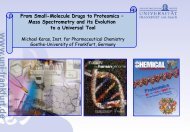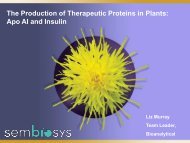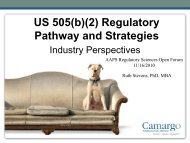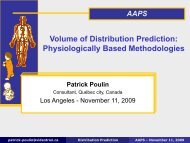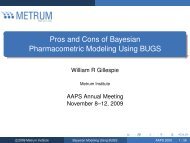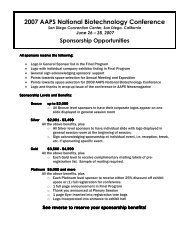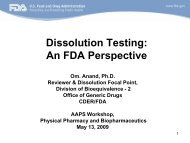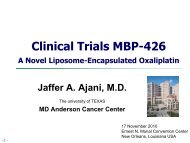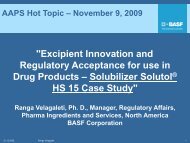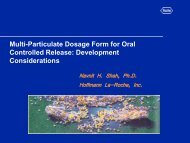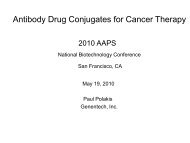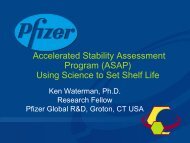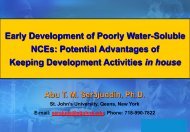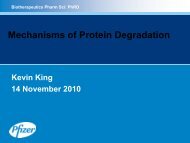Preliminary Program - American Association of Pharmaceutical ...
Preliminary Program - American Association of Pharmaceutical ...
Preliminary Program - American Association of Pharmaceutical ...
Create successful ePaper yourself
Turn your PDF publications into a flip-book with our unique Google optimized e-Paper software.
71<br />
2009 AAPS Annual Meeting and Exposition<br />
AAPS Pharmacokinetics, Pharmacodynamics and Drug Metabolism (PPDM) <strong>Program</strong>ming<br />
8:30 am – 11:00 am<br />
Pharmacokinetic-pharmacodynamic<br />
Aspects <strong>of</strong> Inhaled Lung-targeted Agents<br />
Symposium<br />
Discovery and development <strong>of</strong> inhaled lung-targeted<br />
therapeutic agents such as bronchodilators<br />
and corticosteroids present substantial PKPD<br />
challenges; lung PK is not easily measurable in<br />
preclinical models and may not be measurable in<br />
clinical studies. Systemic PK is relevant for systemic<br />
effects but may not be so for airway effects such as<br />
bronchodilation. Sufficient understanding <strong>of</strong> the<br />
lung as an absorption barrier for small molecules<br />
is not currently available to allow for inference <strong>of</strong><br />
lung PK from systemic observations. Quantitative<br />
dose-exposure-response analysis is rarely possible<br />
because <strong>of</strong> lack <strong>of</strong> relevant exposure data. Therefore,<br />
basic research is needed in order to characterize the<br />
ADME pr<strong>of</strong>ile <strong>of</strong> lung-targeted inhaled agents. This<br />
symposium will provide specific information on the<br />
gaps that exist in our understanding <strong>of</strong> the lung as<br />
an ADME barrier, and in the absence <strong>of</strong> requisite<br />
clinical information, what quantitative tools exist<br />
to help develop PKPD understanding <strong>of</strong> lungtargeted<br />
agents.<br />
Moderators<br />
Dennis K. O’Connor, B.S.<br />
Boehringer Ingelheim <strong>Pharmaceutical</strong>s, Inc.<br />
Balaji M. Agoram, Ph.D.<br />
Pfizer Global Research & Development<br />
Lung ADME<br />
Ann Tronde, Ph.D.<br />
AstraZeneca<br />
Inhalation by Design<br />
Rhys Jones, M.S.<br />
Pfizer Global Research & Development<br />
PK-PD Considerations <strong>of</strong> Inhaled Agents —<br />
Corticosteroids as an Example<br />
Gunther Hochhaus, Ph.D.<br />
University <strong>of</strong> Florida<br />
Bioequivalence Testing for Inhaled Lungtargeted<br />
Agents<br />
Wallace Adams, Ph.D.<br />
U.S. Food and Drug Administration<br />
WEDNESDAY MORNING ROUNDTABLES<br />
9:00 am – 11:00 am<br />
Facilitating the Transition to Modelbased<br />
Drug Development<br />
Roundtable<br />
The goal <strong>of</strong> this roundtable session is to elicit<br />
discussion regarding the issues surrounding<br />
the implementation <strong>of</strong> quantitative modeling<br />
and simulation strategies and their integration<br />
into drug development project timelines. Use <strong>of</strong><br />
these strategies in a model-based development<br />
paradigm has been proposed as a mechanism to<br />
improve both the efficiency and productivity <strong>of</strong> drug<br />
development. However, recognition <strong>of</strong> common<br />
obstacles to the seamless integration <strong>of</strong> these<br />
methods as a critical component <strong>of</strong> decision-making<br />
may facilitate systematic changes to achieve the<br />
optimal benefit. Brief presentations addressing the<br />
role <strong>of</strong> integrated project teams in supporting this<br />
paradigm, the essential infrastructure elements<br />
required for successful implementation, and the<br />
team communication and integration issues to be<br />
addressed for optimal management buy-in and<br />
efficient and informed decision-making will come<br />
before an open discussion <strong>of</strong> lessons learned<br />
and strategies for success. The presentation, the<br />
Other Critical Path: The Role <strong>of</strong> Integrated Project<br />
Teams in Drug Discovery and Development, will<br />
explore the following areas: how do we structure<br />
integrated project teams for maximum efficiency and<br />
effectiveness; what are the roles and responsibilities<br />
<strong>of</strong> the members <strong>of</strong> a drug development integrated<br />
project team; how can an integrated project team<br />
assist a pharmacometrician and facilitate modelbased<br />
drug development; how can integrated<br />
project teams be used to meet aggressive timelines<br />
and facilitate informed decision-making. The<br />
presentation, the Engineering the Pharmacometrics<br />
Enterprise: Science in Support <strong>of</strong> Science, will<br />
discuss the following areas: what are the key<br />
components <strong>of</strong> the pharmacometrics enterprise;<br />
how do we move from model-supported drug<br />
development to model-based drug development;<br />
and what can be done to improve the efficiency and<br />
effectiveness <strong>of</strong> pharmacometrics.<br />
Moderator<br />
Jill B. Fiedler-Kelly, M.S.<br />
Cognigen Corporation<br />
The Other Critical Path: The Role <strong>of</strong> Integrated<br />
Project Teams in Drug Discovery and<br />
Development<br />
David Y. Mitchell, Ph.D.<br />
Mitchell <strong>Pharmaceutical</strong> Consulting, LLC<br />
Engineering the Pharmacometrics Enterprise:<br />
Science in Support <strong>of</strong> Science<br />
Thaddeus H. Grasela, Pharm.D., Ph.D.<br />
Cognigen Corporation<br />
9:00 am – 11:00 am<br />
Impact <strong>of</strong> Pharmacogenomics on Drug<br />
Development: An Industrial Perspective<br />
Roundtable<br />
Pharmacogenomics has emerged as an important<br />
tool for discovering new therapeutic agents as well<br />
as re-evaluating existing drugs for improving their<br />
efficacy and/or applications. The pharmaceutical<br />
industry continues to contribute significantly to<br />
development <strong>of</strong> high-throughput technologies<br />
applied to pharmacogenomic research. Efficient<br />
translation <strong>of</strong> the scientific data into clinical<br />
applications requires careful analyses, prioritization<br />
and streamlining <strong>of</strong> the information at various levels<br />
even as the regulatory approvals are sought. While<br />
pharmaceutical organizations follow their own<br />
set <strong>of</strong> internal standard operating protocols and<br />
process guidelines, it would be useful to provide a<br />
common platform to researchers from the industry<br />
to share their experiences and perspectives on<br />
what strategies worked, how challenges were<br />
overcome, what do they foresee as emerging<br />
issues in the near future, and what is the impact<br />
<strong>of</strong> the pharmacogenomic approach on the overall<br />
economics <strong>of</strong> the drug development/<br />
approval process.<br />
Moderators<br />
Lawrence Fleckenstein, Pharm.D.<br />
University <strong>of</strong> Iowa<br />
Pramod Mahajan, Ph.D.<br />
Drake University<br />
Impact <strong>of</strong> Pharmacogenomics on Drug<br />
Development: An Industrial Perspective<br />
Allen Roses, M.D.<br />
Cabernet <strong>Pharmaceutical</strong>s Inc.<br />
Impact <strong>of</strong> Pharmacogenomics on Drug<br />
Development: A Medco Perspective<br />
Felix Frueh, Ph.D.<br />
Medco Health Solutions, Inc.<br />
Impact <strong>of</strong> Pharmacogenomics on Drug<br />
Development: A GSK Perspective<br />
Ann Saunders, Ph.D.<br />
GlaxoSmithKline plc



